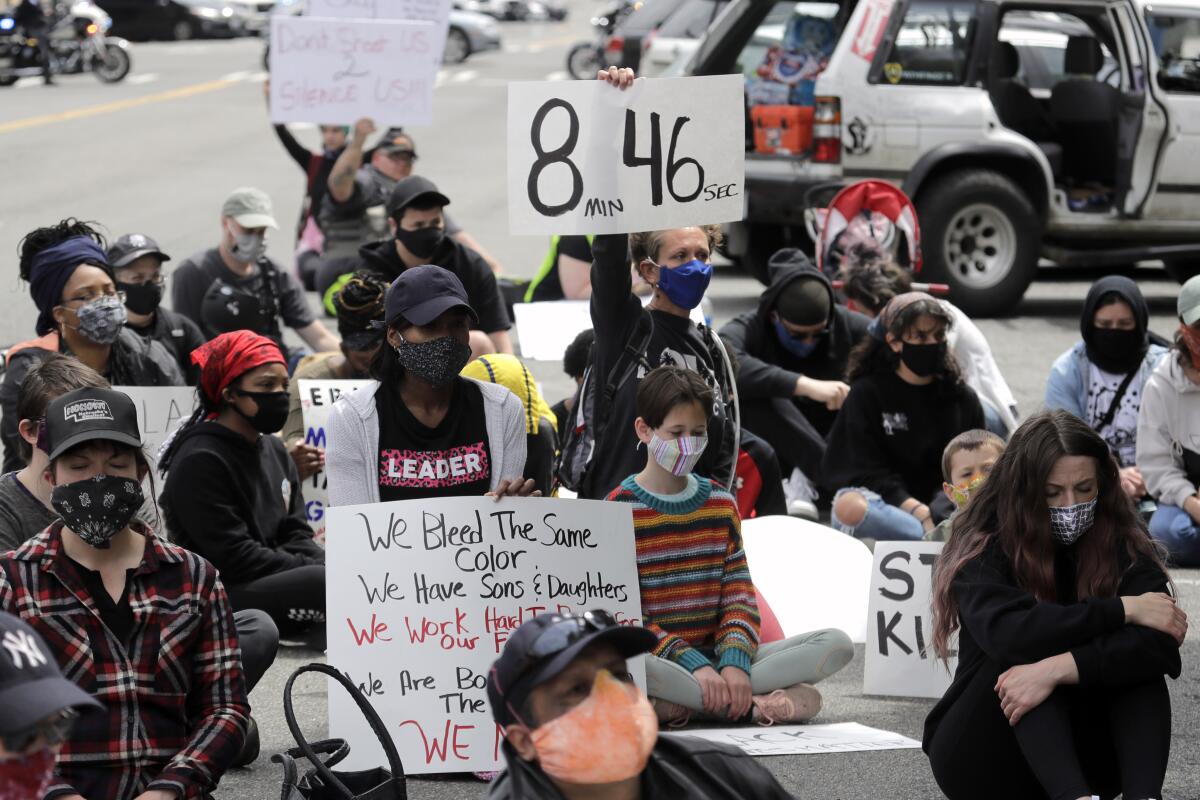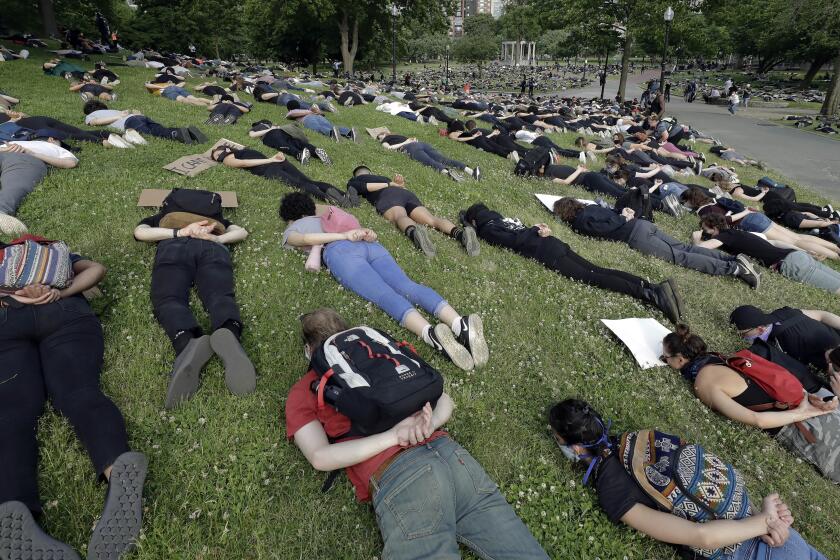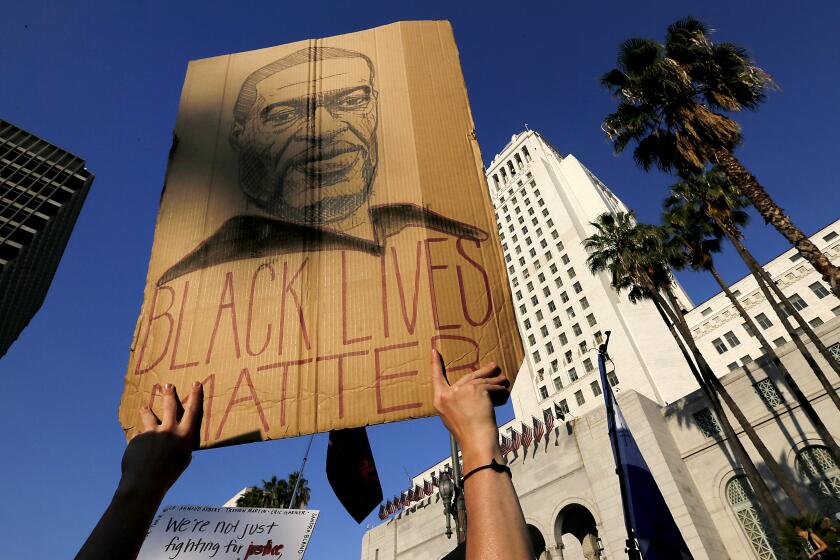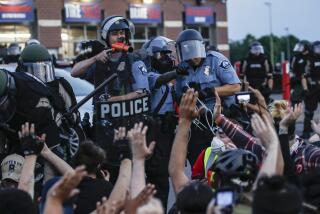Prosecutors say officer had knee on George Floyd’s neck for 7:46 rather than 8:46

MINNEAPOLIS — Minnesota prosecutors acknowledged Wednesday that a Minneapolis police officer had his knee on the neck of George Floyd for 7 minutes, 46 seconds — not the 8:46 that has become a symbol of police brutality — but said the one-minute error would have no impact on the criminal case against four officers.
The initial May 29 complaint alleges that now ex-officer Derek Chauvin “had his knee on Mr. Floyd’s neck for 8 minutes and 46 seconds in total. Two minutes and 53 seconds of this was after Mr. Floyd was non-responsive.” But timestamps cited in the document’s description of the incident, much of which is caught on video, showed Chauvin had his knee on Floyd for 7 minutes, 46 seconds, including 1 minute, 53 seconds after Floyd appeared to stop breathing.
“These kinds of technical matters can be handled in future amendments to the criminal complaint if other reasons make it necessary to amend the complaint between now and any trials,” Hennepin County Attorney Mike Freeman’s office said in a statement. “The one-minute error made no difference in the decision to charge nor in the continuing legal hearings.”
The office had no further comment.
The Associated Press began asking about the error the day after the initial charges were filed, and continued to inquire about it after Minnesota Atty. Gen. Keith Ellison became the lead prosecutor on the case. Prosecutors repeatedly declined to address the discrepancy, even as the time frame of 8:46 began being used by protesters worldwide.
Prosecutors repeated their timeline and the 8 minutes, 46 seconds detail on June 3 when they added a more serious murder charge against Chauvin and announced charges against the other three officers. The AP published a story about the issue June 4, and at the time John Stiles, a spokesman for Ellison’s office, said prosecutors were continuing to review new evidence.
Stiles had no additional comment Wednesday.
In the protest movement surrounding George Floyd’s death, a span of time has turned into an important symbol: 8 minutes, 46 seconds.
Floyd, a Black man who was handcuffed, died May 25 after Chauvin, a white officer, used his knee to pin Floyd to the ground. Chauvin, who kept his knee on Floyd’s neck even after Floyd said he couldn’t breathe and stopped moving, has been charged with second-degree murder, third-degree murder and manslaughter.
The other officers, J. Alexander Kueng, Thomas Lane and Tou Thao, have all been charged with aiding and abetting both second-degree murder and manslaughter. All four officers were fired. If convicted, they potentially face the same penalty as Chauvin: up to 40 years in prison.
It was not immediately clear whether the criminal complaints would be amended. In this case, one minute is unlikely to have a major legal significance.
But in the days after Chauvin’s initial charges, outraged protesters, politicians and mourners seized on 8:46 as a quiet way to honor Floyd at a time of angry and sometimes violent clashes with police. It also became a symbol of the suffering Floyd — and many other Black men — have experienced at the hands of police.
“A one-minute difference is not significant in the grand scheme of things,” said Nekima Levy Armstrong, a civil rights activist and former head of the Minneapolis NAACP. “The bottom line is, it was more than enough time for Derek Chauvin to know that he was literally choking the life out of George Floyd.”
The police use of carotid holds has a troubled history, killing and seriously injuring some people.
When someone takes a moment of silence for 7:46, or 8:46, you realize just how much time that is, Levy Armstrong said.
“It was more than enough time for any rational, compassionate and professional human being to know that their actions were deadly and unconscionable,” she said.
Earlier this month, in Boston and Tacoma, Wash., demonstrators staged “die-ins” for precisely 8 minutes, 46 seconds. In Washington, Democratic senators gathered in the U.S. Capitol’s Emancipation Hall for the nearly nine minutes of silence.
Mourners at a memorial service for Floyd in Minneapolis stood in silence for 8 minutes, 46 seconds, after the Rev. Al Sharpton asked them to “think about what George was going through, laying there for those eight minutes, begging for his life.”
“We can’t let this go,” he said at the memorial. “We can’t keep living like this.”
More to Read
Sign up for Essential California
The most important California stories and recommendations in your inbox every morning.
You may occasionally receive promotional content from the Los Angeles Times.












